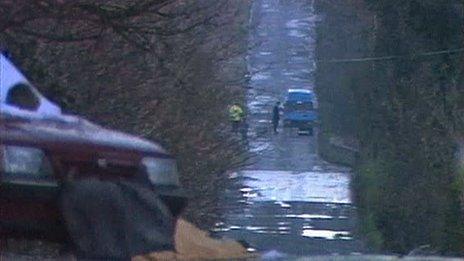Smithwick: Collusion in Bob Buchanan and Harry Breen murders
- Published
Chief Supt Harry Breen and Supt Bob Buchanan were shot dead in an ambush in south Armagh, as Vincent Kearney reports
Irish police officers colluded in the IRA murders of two senior Northern Ireland policemen, an inquiry has found.
Chief Supt Harry Breen and Supt Bob Buchanan were shot dead in an ambush in March 1989 in south Armagh.
The attack happened as they crossed the border into Northern Ireland after a meeting in Dundalk Garda station.
In the report of his inquiry, external, judge Peter Smithwick said he was "satisfied there was collusion in the murders".
Judge Smithwick said the circumstances suggested information was leaked to trigger the IRA operation, and the timing suggested it was "more likely that the information came from Dundalk Garda station".
He said the two policemen had arrived at the station no earlier than 2.20pm, and ten minutes later, the IRA had placed gunmen on the road where they were killed.
"This was as a direct result of confirmation having been received that the officers had arrived at Dundalk," he said.
He added: "Either the IRA did have an extraordinary piece of good fortune, or Harry Breen was the target of this operation. I believe that the evidence points to the latter conclusion.
"I also think that this makes it significantly more likely that the Provisional IRA knew that Chief Superintendent Breen was coming, and were not simply waiting on the off-chance that he might turn up."
The judge said he believed Harry Breen was the IRA's target, as after the killing of eight IRA men and a civilian in Loughgall, County Armagh, by undercover soldiers in 1987, he had been pictured with weapons recovered by police.
'Political expediency'
"There was, in the wake of the murder, triumphalism in relation to the fact that the Provisional IRA had killed the officer who had appeared in that photograph 'etched in every republican's mind'," he wrote.

The men were targeted on their way back from a meeting at Dundalk Garda Station
He found that the IRA needed positive identification that Mr Breen in particular had arrived at the police station in Dundalk, and this positive confirmation would likely be from a member of the Garda.
'No smoking gun'
"Given that I am satisfied that the evidence points to the fact that there was someone within the Garda station assisting the IRA, it also seems to me to be likely that the Provisional IRA would seek to exploit that resource by having that individual or individuals confirm the arrival of the two officers," he said.
The report is also critical of two earlier garda investigations into the murders, which it describes as "inadequate".
The judge said it was "highly regrettable" that the most senior police officers on both sides of the border dismissed speculation of a mole in the immediate aftermath of the killings. He said this was "political expediency" at the expense of the victims.
He said the culture of failing to adequately address suggestions of wrongdoing, either for reasons of political expediency or by virtue of misguided loyalty, has been a feature of life in this state.
He concluded that "too often that culture has resulted, some years later, after doubts, grievances and injustices have festered, in the setting up of investigations, commissions or tribunals of inquiry".
He said he hoped his report would contribute in "one small part to changing that culture".
Judge Smithwick said there was "no smoking gun" and it was not surprising that the tribunal had not uncovered direct evidence of collusion.
Bob Buchanan's son, William, said: "The findings of Judge Smithwick are both incredible and shocking, and confirm the existence of a mole in Dundalk station - this led to my father's death."
A solicitor speaking on behalf of Chief Supt Breen's family said the report was "a truly remarkable exposé and indictment of wrongdoing and collusion with terrorists by some within An Garda Siochána".
The family said the report detailed in the most stark and dramatic fashion the failure by state systems to address these matters year upon year.
Irish Justice Minister Alan Shatter apologised "without reservation" for the failings identified in the report.
"Even with the passage of 24 years and the positive developments which have taken place on the island since, our condemnation of their murder should be as strong today as it was then," he said.
Mr Shatter said nothing in the report should detract from the good work of An Garda Siochána during the Troubles.
His counterpart in Northern Ireland, David Ford, said the suggestion of garda collusion was "no different from the suggestions in the past of one or two RUC officers behaving inappropriately".
"The important issue is that fundamentally the two organisations are good police services, they now work together in a extremely good way," he added.
William Buchanan called the findings 'incredible and shocking'
The publication of the report on Tuesday follows almost eight years of painstaking investigations.
The Dublin-based tribunal was established by the Irish government in May 2005 and began its private investigation phase 10 months later.
Public sessions began in June 2011, hearing from hundreds of witnesses including police from both sides of the Irish border, IRA members, undercover agents and politicians.
It had been recommended by retired Canadian judge Peter Cory, as part of his report on several controversial killings presented to the British and Irish governments in 2003.